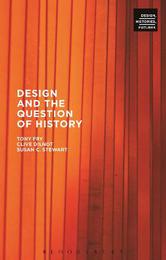
|
Design and the Question of History
Hardback
Main Details
| Title |
Design and the Question of History
|
| Authors and Contributors |
By (author) Tony Fry
|
|
By (author) Clive Dilnot
|
|
By (author) Susan Stewart
|
| Series | Design, Histories, Futures |
|---|
| Physical Properties |
| Format:Hardback | | Pages:320 | | Dimensions(mm): Height 216,Width 138 |
|
| Category/Genre | Art and design styles - from c 1900 to now
Product design |
|---|
| ISBN/Barcode |
9780857854766
|
| Classifications | Dewey:745.409 |
|---|
| Audience | | Professional & Vocational | | Tertiary Education (US: College) | |
|---|
|
Publishing Details |
| Publisher |
Bloomsbury Publishing PLC
|
| Imprint |
Bloomsbury Academic
|
| Publication Date |
26 February 2015 |
| Publication Country |
United Kingdom
|
Description
Design and the Question of History is not a work of Design History. Rather, it is a mixture of mediation, advocacy and polemic that takes seriously the directive force of design as an historical actor in and upon the world. Understanding design as a shaper of worlds within which the political, ethical and historical character of human being is at stake, this text demands radically transformed notions of both design and history. Above all, the authors posit history as the generational site of the future. Blindness to history, it is suggested, blinds us both to possibility, and to the foreclosure of possibilities, enacted through our designing. The text is not a resolved, continuous work, presented through one voice. Rather, the three authors cut across each other, presenting readers with the task of disclosing, to themselves, the commonalities, repetitions and differences within the deployed arguments, issues, approaches and styles from which the text is constituted. This is a work of friendship, of solidarity in difference, an act of cultural politics. It invites the reader to take a position - it seeks engagement over agreement.
Author Biography
Tony Fry is Principal of The Studio at the Edge of the World, Tasmania, Adjunct Professor at the University of Tasmania, Australia and Visiting Professor at Universidad de Ibague, Colombia. Tony has held academic positions in Australia and internationally and is the author of sixteen books, including Design Futuring (Bloomsbury, 2009); Design as Politics (Bloomsbury, 2011), Becoming Human By Design (Bloomsbury, 2012), Remaking Cities (Bloomsbury, 2017), Defuturing (Bloomsbury, 2020) and Writing Design Fiction (Bloomsbury, 2021). Clive Dilnot is professor of Design Studies at Parsons The New School for Design, New York, USA. Recent publications include Ethics? Design? (2005) and the text for Chris Killip: Pirelli Work (2007). Director of Postgraduate Studies and Curriculum Development, Design School, University of Technology Sydney, Australia.
Reviews"Design and the Question of History" argues that the world we inhabit, and its devastation, are thoroughly a product of design. This claim requires a rewriting of the relation between history and design, from which there emerges a powerful ontologically-oriented view of design that may lead us into entirely novel ways of worlding and visions of the human. "Design and the Question of History" offers an ambitious, compelling, and urgent challenge to design studies and to history. The world we live in has been fashioned and fabricated by design. The futures we can live are determined by these histories. This is scholarship that matters. The provocative essays in this volume are at once a critique of history and a call for its relevance to the present and future. Within the provocation is the question of how design and its history can inform our actions in a world that presents extreme difficulties but also unprecedented opportunities to create a positive future. This is a work of intense and vital scholarship. Fry, Dilnot and Stewart cut to the heart of what is at stake in how we question design, history, and the future. Design history will either rise to the challenge of this book or fade into irrelevance. This is unashamedly a work of design philosophy. In fact, it is exactly the kind of philosophy that is needed now, as it confronts vital issues not just for design and the 'post-discipline' of history, but also of 'now' and the future. Fry, Dilnot and Stewart approach their common project with different voices, their passion and seriousness shining throughout.
|